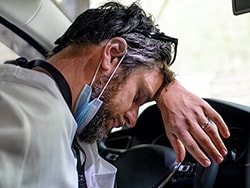What Happens After an Impaired Driving Charge?
Driving under the influence (DUI) comes with criminal penalties that range from fines and loss of license to jail time. Despite the risks, an estimated 2800 physicians are arrested for DUIs annually according to the Center for Professional Recovery.

Research shows that problematic alcohol use among physicians has increased and could affect up to one third of doctors. More than half of physicians believe the COVID-19 pandemic has increased substance abuse in the medical profession.
In addition to criminal penalties, doctors who are charged with DUI also face disciplinary actions from their state medical board — and the penalties can be severe.
"Criminal investigations that are conducted by law enforcement and carried out in the justice system are completely separate from investigations that occur from a regulatory standpoint," said Jae Williams, press secretary for the Florida Department of Health. "The [state medical] board's not looking at morality or criminality; they're looking at the regulatory implications against the standard of care."
Diagnosing Discipline
Just as the criminal penalties for DUI are different in each state, state medical boards have their own processes for learning about impaired driving charges and deciding on disciplinary action.
State medical boards require applicants to complete state and federal background checks, and DUI charges will show up on those reports; questions on the applications for licensing and renewals often include questions about arrests and convictions; and licensees might self-report outside of their renewal periods, according to Jerica Stewart, communications officer for the State Medical Board of Ohio.
State medical boards, hospitals, and health plans can also report incidents to the National Practitioner Databank, a database that includes malpractice reports and "adverse condition" charges that can include DUI.
Once the report is made, state medical boards must decide how to deal with the issue, and Nick Dowgul, lead attorney at North State Law, a firm that represents professionals in hearings with North Carolina licensing boards, explained that there is a lot of latitude in their responses. The options range from closing the complaint (with no action against the practitioner) to pursuing a revocation of licensure.
Examining the Evidence
The medical board reviews the facts of the case before voting on any penalties. One of their primary concerns is public safety.
"Medical boards have authority over the practice of the physician and are the only entity that can take away a physician's license to practice medicine," said Stewart. "If a medical board determines a licensee has violated a rule or law that creates a patient safety concern (regardless of whether the violation was directly related to patient care), the medical board is responsible for protecting the public."
A doctor who is charged with impaired driving while traveling to or from their shift at a hospital might face the same criminal charges as a doctor pulled over for DUI after leaving a party, but Williams noted that the state medical board considers one action a more serious breach of professional ethics.
The doctor traveling to or from work, he explained, "would be seen as practicing outside of the standard of care because either he's going to work with the intention of practicing under the influence or coming from work where we can reasonably assume he was practicing under the influence."
In North Carolina, a doctor might receive a "private letter of concern" that directs them to improve their behavior; these letters are not made public but become part of the practitioner's permanent file with the state medical board. More severe penalties include a public letter of concern, which can also include a reprimand, period of suspension, probation, or loss of the medical license.
The Ohio State Medical Board also can limit, suspend, revoke, or refuse to renew a medical license. In 2023, the board introduced the confidential monitoring program that allows licensees to receive confidential treatment and support that could include random urine screening, going into addiction treatment, or participating in ongoing counseling in a non-disciplinary program.
"The board had growing concerns that fear of discipline or loss of licensure prevented licensees from coming forward to seek help for impairment-related concerns," Stewart told Medscape Medical News.
Resuscitating Your Career
Doctors who are charged with DUI face criminal penalties and disciplinary actions, as well as potential damage to their reputations that can affect their careers. Arrest reports are public record — and some newspapers publish local arrests — which can alert the public that a doctor was charged with a DUI. State medical boards might also post public notices or maintain information in their public databases.
Dowgul encourages doctors facing disciplinary actions for impaired driving to hire experienced attorneys to represent them in hearings with the state medical board, explaining, "It's very difficult to face an allegation like this where your livelihood's at stake."
Even though DUI is a serious charge, it doesn't have to end a medical career. In Ohio, the medical board has worked with "hundreds of licensees" who have sought help and received treatment after a DUI charge and continued to have successful careers — but Stewart noted that the onus is on the doctors to follow the law, remain engaged in treatment, and prioritize patient safety if they are allowed to retain their medical licenses.
Williams shares a similar sentiment. "We appreciate these individuals wholeheartedly, but we also take our responsibility to regulate and ensure the safety and health and well-being of our residents very seriously," he said.
"We're going to hold you accountable…and if you're going to practice recklessly and you're not holding the best interest of patients in mind, you're going to be regulated."
Jodi Helmer is a freelance journalist who writes about health and wellness for Fortune, AARP, WebMD, Fitbit, and GE Health.


 Admin_Adham
Admin_Adham


